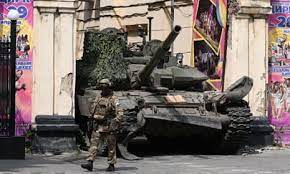Peter Pomerantsev
Yevgeny Prigozhin’s aborted insurrection against Vladimir Putin made for popcorn-gobbling viewing, full of social media twists and turns, as Russia’s generous collection of war criminals challenged one another. It was tempting to just sit back and gawp as Russia’s “great power” image was reduced to the photo of a tank in Rostov-on-Don seemingly stuck at the gates to the city circus. But we are not passive observers of this show: each of one of us influences its ultimate outcome.
Putin appears weaker than ever – and for a ruler who relies on projecting strength, that’s a bad look. To further dull Putin’s fading aura of invincibility, and to ultimately lead to a reversal of Russia’s invasion of Ukraine, we need to undermine the pillars his strongman myth is based on: colonial conquest, unregulated capitalism and climate abuse. As questions are raised about his ability to rule, Putin will claim that despite the efforts of the nefarious “collective west”, the Russian economy can stabilise because the world needs Russian fossil fuels; that the need of western companies to make money in Russia means it will never be truly isolated; that for all his blunders on the battlefield, he can still hold on to swathes of Ukraine and its resources, which he will dole out between the Russian system’s stakeholders for whom the risk of sticking with Putin will thus still be smaller than the risk of going against him.
Rather than being a garish show unrelated to us playing out in a distant country, Putin’s power is deeply connected to huge generational challenges that we vitally need to confront. First, don’t normalise colonial conquest. When some in the west urge Ukraine to “negotiate” with Russia and cede territory in order to gain “peace”, this is a green light for wannabe imperial powers anywhere to go forth, conquer and extract. Instead, ensure Ukraine receives all the military support it needs to liberate itself from Russian imperialism, and gains all the security guarantees necessary to prevent Russia ever invading again. Establishing a tribunal for the crime of aggression, as proposed by the lawyer Philippe Sands, would also send a signal that unprovoked invasion, whether by Russia or any other power, will not be normalised.
Second, push western companies to abandon Russia. Despite some companies leaving Russia at the start of the invasion, many more have remained, including well-known luxury brands. But there are also positive examples of civil society, workers and consumers pushing together for change. Take the case of the maker of Sweden’s Absolut vodka, which ceased exporting the brand to Russia after widespread calls for a boycott. A public campaign then pressured Absolut’s parent company, Pernod Ricard, to pull out of Russia entirely.
More serious than the impact of consumer brands is the continued use of sophisticated western machinery and exports that enable manufacturing for the Russian army. Companies such as Haas Automation have been accused of continuing to ship machines and parts to Russia (the company says that no machines have been shipped from its factory to Russia since March 2022, and that it has been fully compliant with US export controls). All technology firms must be vigilant about the use of their products in crimes against humanity. From using kill switches to disable their technology, to actively tracking where their machines end up, there are numerous ways tech firms can take responsibility – and they must.
The issue here is not just with one or two companies, but with a whole ideology. For decades, Putin’s crimes were enabled by business and political actors who claimed that greater economic interconnection would lead to a more peaceful Russia. Even after Russia’s invasion and annexation of Crimea in 2014, German companies, especially, continued to expand their business with Russia. For decades, human rights concerns were thrown out – who needed them, when on both sides economic self-interest would ultimately dictate government policy? This thinking ignored the fact that the Russian regime interpreted this laissez-faire approach as a green light for escalating repression and aggression. The west cared only about business – why would it react to invasions? That ideology, or rather that ideological excuse for short-term greed, is bankrupt.
We need to recognise the fact that human rights, security and economic ties are deeply intertwined, and to alter our behaviour accordingly. Let’s stop selling dictators the rope with which they hang people: our neighbours – and ultimately us. And if there’s one base element that powers Putin’s claims to invincibility, it’s reliance on fossil fuels. The battle against Putin is also the battle against climate crisis. As Prof Alexander Etkind lays out in his new book, Russia Against Modernity, Putin’s economy has been up to two-thirds dependent on oil and gas exports, largely to Europe, and crucially through pipelines that cross Ukraine.
Etkind argues that Putin launched his invasion in part to control this flow. Moreover, he wanted to destabilise Europe, flooding it with refugees and instilling so much chaos and fear that Europe would be forced to abandon plans for net zero carbon emissions by 2050. As so often in the course of this war, Putin’s aims have backfired. The invasion has led to a decrease in dependence on Russian energy. Putin’s aura of fossil-fuelled invincibility has been shaken, but we are only part of the way there. Faster decarbonisation is the most sustainable way to not only undermine Putin, but also to limit the opportunity for future Russian leaders and other resource-rich authoritarians to wage aggressive wars.
The Guardian







